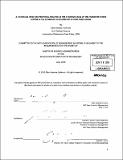A historical view and proposal analysis of the strategic role of the transportation sector in the economic development of post-war Liberia
Author(s)
Kwame Corkrum, Ellen
DownloadFull printable version (4.352Mb)
Alternative title
strategic role of the transportation sector in the post-war economic development of Liberia : how can the strategic development of Liberia's transportation sector promote the nation's attainment of its post-war economic development goals?
Other Contributors
Sloan School of Management.
Advisor
Gabriel R. Bitran.
Terms of use
Metadata
Show full item recordAbstract
This thesis examines the proposals for building and improving the transportation sector in Liberia, primarily the roads while providing immediate social opportunities and employment for many of the poor in Liberia. As Liberia emerges out of a protracted civil conflict and makes strives on a number of socio-economic fronts, the need to prioritize the transport sector is a critical part of the nation's rebuilding efforts. A large portion of the country lacks basic infrastructure. This has put an enormous strain on economic and social services, lead to an increase in poverty, marginal health care and lack of education. Improving the transport sector will help stimulate economic viability, expand public services and provide admission to and from urban centers. Connecting the rural areas with urban centers and markets means improved infrastructure at an affordable cost, taking into account the environmental challenges and decreasing its damaging effects. This will also help Liberia become a role model in the ever challenging global forum of nations and industries going green. Achieving this is not always an easy task, because although, Liberia has an enormous amount of good will from donor countries, road projects have remained a daunting undertaking. The stakeholders must come to terms with developing a comprehensive approach to rebuilding the country's transportation network. Studies must be conducted to understand the cost benefit of rebuilding road network throughout the country. Once these studies are completed, a diligent effort to execute a plan must be initiated. For each policy to serve its significance, the various modes of transportation in the country must be harmonized and directed under a governing body, such as the Ministry of Transportation. Within this governing body, there must be a system of checks and balances, ensuring that the interests of the citizens are at the forefront. Several recommendations have been examined: the logistics and talent makeup of the transportation team, authority within the team, tax and toll policies, unification of sectors, and contributions by private investment firms. As Liberians prepare for the next presidential election, the next five years should be used as a timeline to implement and measure success. Finally, a contingency plan outlines basic, yet productive approaches to improve roads immediately, while providing jobs for many of the unemployed.
Description
Thesis (M.B.A.)--Massachusetts Institute of Technology, Sloan School of Management, 2010. Cataloged from PDF version of thesis. Includes bibliographical references (p. 37).
Date issued
2010Department
Sloan School of ManagementPublisher
Massachusetts Institute of Technology
Keywords
Sloan School of Management.